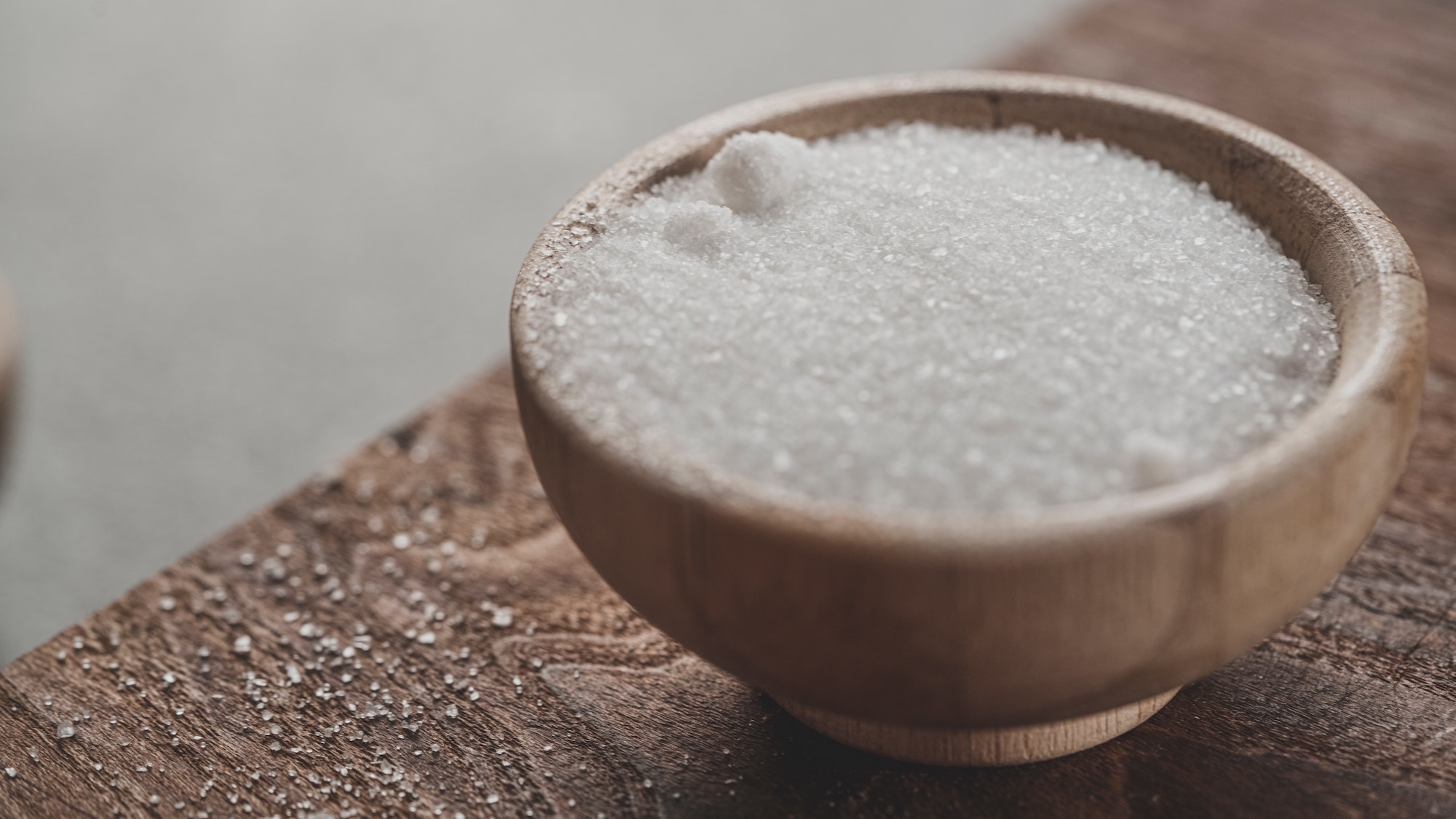Erythritol is a sugar alcohol with a sweetness similar to table sugar. It is around 60-80% as sweet as sucrose (table sugar), and has zero calories per gram.
8 best erythritol products
- Whole Earth Erythritol: Erythritol is a great alternative to sugar for those who want sugar-like sweetness and texture without the calories. Our erythritol is a sugar alcohol derived from non-GMO corn
- Plant Based Sweetener: Whole Earth 100% Erythritol can be used as a sugar substitute in cooking and baking or as a zero calorie, low carb sweetener for coffee, tea, smoothies, and other beverages
- Just Sweet Enough: Erythritol has a low glycemic index and can be used in place of sugar in recipes or beverages. It has about 70% of the sweetness of sugar without the calories. Kosher, gluten free
- Baking Sugar Substitute: Erythritol has a crystalline structure and great resistance to heat, making it a great sugar substitute for baking. This plant based sweetener is suitable for paleo, keto, and diabetic diets
- Whole Earth Plant Based Sweeteners: Our low and zero calorie plant based sugar substitutes are great for coffees, teas, cocktails, baked goods, and snacks. Available in packets, liquids, bulk pouches and jars
- USDA ORGANIC: Durelife organic Erythritol is certified by the United States Department of Agriculture (USDA) as organic. This means that it is produced using organic methods and free from synthetic pesticides and fertilizers.
- NON-GMO PROJECT VERIFIED: Erythritol is verified by the Non-GMO Project, meaning that it is produced without genetically modified organisms (GMOs) and meets strict standards for GMO avoidance.
- KETO APPROVED: Erythritol is a popular sweetener among people following a ketogenic (keto) diet because it is low in carbohydrates
- OU KOSHER: Erythritol is certified as Kosher by the Orthodox Union (OU), meeting the dietary requirements of many Jewish consumers. The OU is a widely recognized and respected kosher certification agency.
- ZERO-CALORIE: Erythritol is a sweetener that contains no calories, making it an excellent option for people who want to reduce their calorie intake without sacrificing the sweet taste.
- Product Type:Sugar Substitute
- Item Package Dimension:6.604 cm L X12.7 cm W X24.13 cm H
- Item Package Weight:0.499 kg
- Country Of Origin: United States
- Organic Erythritol Is A Naturally Occurring Sugar Alcohol Derived From Non-Gmo Corn And Is About 70% As Sweet As Sugar Without Any Calories.
- Premium Erythritol Sweetener - Granular
- 70% as Sweet as Table Sugar with Zero Calories
- Batch tested and verified gluten-free and Sulphur Dioxide Free
- Not Genetically Modified & Contains no genetically modified proteins.
- 5lb bag of Erythritol Granules in Resealable Bag
- USDA Certified Organic Erythritol Granular Sweetener
- Batch tested and verified gluten-free and Sulphur Dioxide Free
- Zero Calorie Sugar Substitute, Vegan, Keto & Paleo Friendly
- 70% as Sweet as Table Sugar with Virtually Zero Calories
- Use in place of sugar, sprinkle on fruits, add it to beverages and baked goods
- Micro Ingredients Erythritol Sweetener (Granular), 6 Pounds, No After Taste, No GMOs and Vegan Friendly.
- 1:1 Sugar Substitute, Keto Friendly, Zero Calories and Zero Carb (It contains almost No Calorie), Natural Sweetener that Tastes and Bakes Like Sugar (It has 70% of the sweetness of sugar), Premium Erythritol for Baking, Natural White Sugar Alternative.
- No GMOs, No Additives, No Preservatives, No Artificial Colors, No Flavors, No Soy, No Fillers and Gluten-Free.
- Scoop included to get the measurement every time. Take it daily with or between meals by adding it to a shake or smoothie, see what the most nutrient dense food on the planet is all about.
- Powder lover? Take it naturally in powder for higher concentration, quicker absorption, easier on the stomach, and more ways to have fun!
- Pleasant-Tasting Natural Sweetener
- Great for Reduced-Calorie and Sugar-Free Recipes
- Quantity - 2.5 lbs, Servings Per Container about 284
- Low Glycemic Impact
- USDA Certified Organic Erythritol Sweetener - The BEST Sugar Replacement - Plant Based - Zero Calories!
- 100% Pure - No Additives, Synthetic or Artificial Ingredients; Produced from Glucose
- Great for Keto Diets & other Special Diets - Low Glycemic Index - Does Not Spike Blood Sugar
- Use In Baking Recipes, Beverages, Smoothies, and Much More!
What Is Erythritol?
Erythritol occurs naturally in some fruits and vegetables, and can also be produced commercially from glucose. It is used as a food additive and for many other industrial applications.
Erythritol has a variety of benefits over other sweeteners. It is non-glycemic, so it does not affect blood sugar levels. Additionally, it does not promote tooth decay, and actually has a protective effect on teeth due to its antibacterial properties. Erythritol is also safe for people with diabetes.
There are a few potential drawbacks to using erythritol. It can cause bloating and gastrointestinal discomfort in some people. Additionally, it is not as heat-stable as other sugar alcohols, so it may not be suitable for baking or cooking applications.
Overall, erythritol is a safe and healthy alternative to other sweeteners on the market. If you are looking for a non-glycemic option with similar sweetness to table sugar, erythritol may be a good choice for you.
[Check out some of our other awesome guides.]

What Are The Dangers Of Erythritol?
Erythritol is a sugar alcohol that is naturally occurring in fruits and vegetables. It is also produced commercially for use as a food additive. Erythritol has a variety of health benefits, but there are also some potential dangers associated with its consumption.
One of the most well-known dangers of erythritol is that it can cause gastrointestinal distress when consumed in large amounts. This is because erythritol is not completely absorbed by the body and can ferment in the gut, leading to bloating, diarrhea, and other uncomfortable symptoms.
Another potential danger of erythritol is that it may contribute to weight gain. Although erythritol does not contain calories, it can still cause weight gain by stimulating the appetite and increasing the intake of other calorie-dense foods.
Finally, erythritol may also have negative effects on blood sugar levels. Although erythritol does not raise blood sugar levels itself, it can still contribute to fluctuations in blood sugar levels by interfering with the body’s natural regulation of insulin.
Despite these potential dangers, erythritol is generally considered safe for most people when consumed in moderation. If you are concerned about any of the potential risks associated with erythritol, be sure to speak with your doctor or healthcare provider.
[Check out this guide to the keto diet.]

Is Erythritol Worse Than Sugar?
Erythritol is a sugar alcohol that is often used as a sugar substitute. It is found naturally in some fruits and vegetables, and is also produced commercially. Erythritol has a variety of benefits, including being lower in calories than sugar and not affecting blood sugar levels. However, there are also some potential drawbacks to using erythritol, such as its effect on gut health.
So, is erythritol worse than sugar?
Here’s a look at the pros and cons of erythritol to help you decide if it’s the right sweetener for you.
Pros of Erythritol
– Lower in calories than sugar: One gram of erythritol contains only 0.24 calories, compared to the 4 calories in one gram of sugar. This means that erythritol can help you cut down on calories if you’re trying to lose weight.
– Doesn’t affect blood sugar levels: Because erythritol is absorbed slowly and doesn’t raise blood sugar levels, it’s a good choice for people with diabetes.
– May improve oral health: erythritol has been shown to reduce the growth of plaque and bacteria in the mouth, which means it may help improve oral health.
Cons of Erythritol
– May cause digestive issues: Some people may experience bloating, diarrhea, or gas when they consume erythritol. This is because the body doesn’t absorb it well and it can ferment in the gut.
– May not be as sweet as sugar: Although erythritol is about 70% as sweet as sugar, some people may find it to be less sweet than they would like.
– May not be suitable for baking: erythritol doesn’t dissolve well in liquid and can make baked goods dense and hard. It also doesn’t brown or caramelize like sugar, so it may not be the best choice for certain recipes.
So, is erythritol worse than sugar?
The answer to this question depends on your individual needs and preferences. If you’re looking for a lower calorie sweetener that doesn’t affect blood sugar levels, erythritol may be a good option for you. However, if you’re concerned about digestive issues or finding a sweetener that tastes exactly like sugar, you may want to consider other options.
Is Erythritol Harmful To Humans?
Is erythritol harmful to humans? This is a question that many people ask, as they are concerned about the possible health effects of this sugar alcohol.
Erythritol is a sugar alcohol, which means that it is a type of carbohydrate that is metabolized differently than sugar. Sugar alcohols are absorbed more slowly by the body, and they are not broken down into glucose like other carbohydrates. Additionally, erythritol does not cause tooth decay or raise blood sugar levels.
There have been some studies conducted on animals that have shown that erythritol may be harmful in large quantities, but there is no evidence to suggest that it is harmful to humans. In fact, erythritol is actually considered to be a safe food additive by the FDA.
So, in conclusion, there is no evidence to suggest that erythritol is harmful to humans. However, as with any food additive, it is always best to consume it in moderation.
[Check out this guide to coconut oil.]

Is Erythritol As Healthy As Stevia?
Erythritol is a sugar alcohol that is often used as a sugar substitute. It is found naturally in some fruits and fermented foods, and can also be produced synthetically. Erythritol has a lower calorie content than sugar, and does not cause tooth decay. However, it can have a laxative effect if consumed in large amounts.
Stevia is a plant-based sweetener that has been used for centuries in South America. It is 300 times sweeter than sugar, but has no calories. Stevia does not cause tooth decay or have any known side effects.
So, which one is healthier? Both erythritol and stevia are low in calories and do not cause tooth decay. However, stevia is a natural product while erythritol is synthetic. Stevia also does not have any known side effects, while erythritol can cause digestive issues in some people. Therefore, stevia may be the healthier choice for those looking for a sugar substitute.
What Is The Difference Between Erythritol And Xylitol?
Erythritol and xylitol are two types of sugar alcohols. They are both used as sweeteners, but there are some key differences between the two.
Erythritol is about 70% as sweet as sugar, while xylitol is about as sweet as sugar. Erythritol is also less likely to cause tooth decay than xylitol.
Xylitol is a bit more calorie-dense than erythritol, but both are low in calories overall. Erythritol is absorbed better by the body than xylitol, so it may cause less digestive upset.
So, what is the difference between erythritol and xylitol? Erythritol is less sweet than xylitol and is better absorbed by the body. However, xylitol may be a better choice for people who are trying to avoid sugar and calories.
Is Erythritol Natural?
Erythritol is a naturally-occurring sugar alcohol that is found in some fruits and vegetables. It has a very low calorie content and does not cause any spikes in blood sugar levels. Erythritol is also a safe alternative to artificial sweeteners.
What Is The Chemical Formula For Erythritol?
Erythritol is a sugar alcohol with a chemical formula of C4H10O4. It is found in many fruits and vegetables, as well as in fermented foods like wine and beer. Erythritol has a variety of uses, including as a food additive, sweetener, and bulking agent. It is also used as an acne treatment and to relieve the symptoms of allergic reactions.
What Is Erythritol Made From?
Erythritol is a type of sugar alcohol that is naturally derived from plants. It is commonly used as a sugar substitute in many processed foods and beverages. Unlike other sugar alcohols, erythritol does not cause digestive issues like gas and bloating. Additionally, it has been shown to have some health benefits, such as reducing the risk of cavities and heart disease.
Erythritol is made from plant-based sources, such as corn or wheat. The sugar alcohol is then extracted from these plants and refined to create a pure erythritol product. Erythritol can also be made in a laboratory setting by fermenting glucose with yeast.
While erythritol does not have the same sweetness as sugar, it is still a popular choice for those looking to reduce their sugar intake. Additionally, erythritol does not affect blood sugar levels like other types of sugar alcohols. This makes it a safe choice for both diabetics and people with prediabetes.
If you are looking for a sugar substitute that is plant-based and has health benefits, erythritol may be a good option for you. However, it is important to speak with your healthcare provider before making any changes to your diet.
Does Erythritol Cause Belly Fat?
Erythritol is a sugar alcohol that has been shown to have some potential health benefits. However, there is also some evidence that erythritol may contribute to weight gain, particularly around the waistline.
So, does erythritol cause belly fat? Let’s take a closer look at the evidence.
Studies in rats have shown that erythritol can lead to increases in body fat. One study found that rats fed a high-erythritol diet gained more weight and body fat than those not fed erythritol. The erythritol-fed rats also had more abdominal fat.
Human studies on erythritol and weight gain are limited. However, one study did find that erythritol was associated with an increase in waist circumference.
Overall, the evidence suggests that erythritol may contribute to weight gain, particularly around the waistline. So, if you’re trying to lose weight or avoid gaining weight, it’s best to limit your intake of erythitol-containing foods.
Is Erythritol Inflammatory?
Erythritol is a sugar alcohol that is commonly used as a sugar substitute. It is found naturally in some fruits and vegetables, and is also produced synthetically. Although it is safe for most people to consume, some people may experience gastrointestinal side effects such as bloating, gas, and diarrhea. Some research has suggested that erythritol may have anti-inflammatory properties, but more research is needed to confirm these findings. If you are concerned about the potential for erythritol to cause inflammation, speak with your healthcare provider.
Does Erythritol Harm Gut Bacteria?
Erythritol is a sugar alcohol that is commonly used as a sugar substitute. It is found naturally in some fruits and vegetables, and is also produced commercially. Erythritol has a variety of benefits, including being 60-80% as sweet as sugar but with far fewer calories. It also does not affect blood sugar levels like other sugars do.
However, there is some concern that erythritol may harm gut bacteria. This is because erythitol is broken down by gut bacteria into compounds that can be toxic to the cells lining the gut. In high concentrations, these compounds can damage the gut barrier, which can lead to inflammation and other health problems.
At this time, there is no definitive evidence that erythritol harms gut bacteria. However, more research is needed to understand the potential risks and benefits of this sugar alcohol. Until then, it is important to be aware of the potential risks when consuming erythiritol-containing foods or products.
Benefits Of Erythritol
Erythritol is a sugar alcohol that has been shown to have several benefits for human health. It is low in calories and does not affect blood sugar levels, making it a good choice for people with diabetes or those who are looking to lose weight. Additionally, erythitol has been shown to reduce the risk of cavities and other dental problems. Finally, erythritol may also help to protect the liver from damage.
Other Factors To Consider
There are other things to consider, when it comes to erythritol. Other options, like sorbitol, fructose, maltitol, aspartame, and stevia may have a bad impact on either your insulin levels, blood glucose levels, your body weight – or just have a weird aftertaste.
Sugar-free and natural sweeteners will obviously always be low in calories, but things like polyols and mannitol can sometimes cause gastrointestinal discomfort. Treat your small intestine right, and do not go too heavy into any sugar replacements or sugar alternatives.
The effects of erythritol are generally mild, and the chewing gums with zero calories (made from monk fruit, or other low-carb, tooth-friendly options) are generally very safe. Still, you don’t want too much getting in the way of your oral bacteria.
Some consumers report a cooling effect of erythritol (as well as other non-sugar alternatives with a sweet taste), so try multiple options, and see what has the best mouthfeel for you personally. Supplements are not regulated by the Food And Drug Administration, so candies, creams, foods, and other items made with GMO products (or things like Truvia and erythritol) – may or may not be regulated.
However, low carb and keto approaches are generally better for you than diets with lots of regular sugar. Your stomach enzymes will usually respond better to alternatives like erythritol, than regular sugar.
The Bottom Line On Erythritol
Erythritol is a fine alternative to sugar. If you are looking to do a low carb or keto approach, it’s a great way to sweeten up your diet.
Of course, low sugar and avoiding sugar alternatives is an even better approach – but there doesn’t seem to be much downside to moderate erythritol use. If you liked this article, be sure to check out some of our other in-depth and comprehensive guides.











